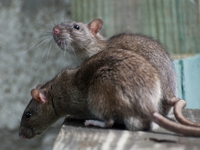There has been some good news and some not so good news for professional rodenticide users over the past week and, unfortunately for UK pest management professionals, its in Germany where good progress has been achieved.
The good news from the German pest control association (DSV) is that agreement has been reached with its regulators on the necessary Risk Mitigation Measures (RMM) for anticoagulant rodenticides. Unlike in the UK the regulators in Germany make no distinction between first and second generation anticoagulants.
|
To summarise, German pest controllers now know that, in general, permanent baiting is prohibited but, there are exceptions to this and, importantly, it is professional pest controllers who are the people making the judgements. Professionals are allowed to protect premises from potential invasion by using permanent baiting, inside and directly outside (doors, ramp etc.) of a facility, but only:
In such circumstances permanent baiting is allowed with visit intervals of up to four weeks. If there is an infestation (a small bait take is not considered an infestation), the RMM demand a weekly visit by a professional until the pest is successfully dealt with. There are different time intervals for sewer systems. It is also mandatory to clean and to retrieve all baits at the end of the treatment once the infestation or the permanent baiting is terminated. Andreas Beckmann, chief executive at DSV, commented: “Despite not being involved in the initial lawmaking and RMM definition process, our negotiations and efforts have resulted in a fruitful outcome for both German pest control companies and the environment. “We have in place a reasonable approach to protect goods and commodities and we are no longer endangering non-target species in lawns, fields and other green areas around properties and factories. |
|
|
|
“To compensate for the business our industry loses we have new income sources from the newly specified service intervals and the collection of unused bait, which is now mandatory. We have reached a fair compromise and shown just how important a strong pest control association really is.” English farmers’ union makes unhelpful comment The UK regulator, the HSE, has already made it plain that it wants to see a common approach to training for proof of competence purposes across all users of professional products. Whilst this does not mean everyone who uses professional SGAR products must hold exactly the same qualification – it does mean some comparable proof of competence is being sought. As Farmers Weekly reported last week, this means that farmers may soon be required to undergo training in rodenticide use. The report said: “Under proposals being considered for a new industry-led stewardship regime, farmers would have to pass a basic training course to apply second-generation anticoagulant rodenticides (SGARs) on farms and holdings.” Commenting on this likely requirement, NFU vice-president Guy Smith rather unhelpfully said: “Farmers need to control rats on their farms for the benefit of everyone and suggesting they need to go on training courses to do so is a complete overreaction. “While we encourage farmers to use rodenticides responsibly so they are not picked up by non-target species, we think this is covered by assurance schemes and the instructions on the packs. There is no need to require farmers to jump through yet more hoops.” |
||



